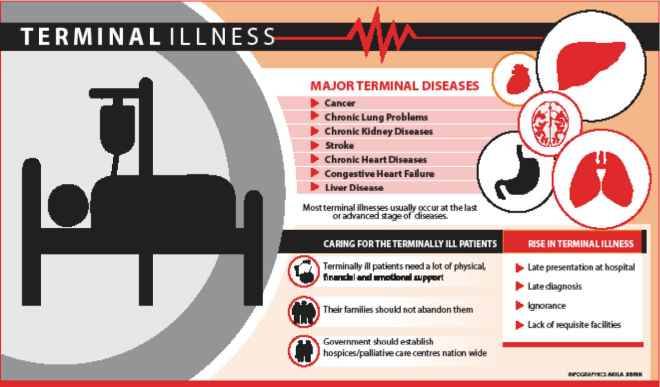
Terminally ill patients and their families experience untold hardships in the country due to absence of requisite facilities, financial burden as well as ignorance on how to take care of the patients.
Daily Trust findings also revealed that in spite of the huge amounts of money required to care for terminally-ill persons, the patients and their families pay from their pockets as government does not pay or subsidise the healthcare services for them. The National Health Insurance Scheme (NHIS) also does not cover most terminal illnesses.
Findings also revealed that aside the absence of special centers for treatment of terminally ill persons, many hospitals lack required equipment for the treatment of terminal illnesses such as radiotherapy and dialysis machines.
Some common terminal diseases include cancer, chronic lung problems, chronic kidney diseases, stroke, chronic heart diseases, congestive heart failure, and liver disease. Most terminal illnesses usually occur at the last or advanced stage of the disease.
What doctors say about diseases
According to a consultant gynecologist in Abuja, Dr. Samuel Ojah, terminal illness is a serious disease from which a person is likely to die in a short time, usually less than a year.
“A terminal ailment or illness is one that will lead to death despite the best treatment anywhere, there is no cure,” said Dr Tunde Abegunde, another consultant in Abuja.
He said many people usually take their terminally ill relative to hospitals and spend lots of money before the person eventually dies and take the patient home when they have run out of money while some go to prayer houses or native doctors.
Dr Abegunde said there are places abroad called hospices where terminally ill people are taken to for care, “but I am not aware of any hospice in Nigeria.” Dr Abubakar Kaoje, a consultant in Birnin Kebbi, said doctors can only offer people who are diagnosed with these kinds of ailments palliative care, adding that they need to be comforted, and to die with dignity and love.
A Kaduna based medical doctor, Dr Hassan Bala Salihu, said breast and cervical cancers are leading terminal illnesses among women while prostate and colon cancers are leading killer diseases among men.
He said cancers that affect vital organs like the lungs, stomach, and brain among others are terminal. According to him, such diseases are very hard to manage and a large percentage of people affected eventually die.
He said a dialysis session, for instance, costs at least N30,000 and drugs for Hepatitis C for instance costs N80,000 a week. “I know a patient whose drug costs N800,000 and it has to be ordered from India because it is not available here in Nigeria,” he added.
Patients, relatives narrate experiences
A patient simply identified as Agbonma said she was diagnosed of breast cancer three years ago. Few months ago, her doctors told her the cancer has spread to her bones and her brain. She now stays with her mother in their family home because she can barely take care of herself. Her mother takes her to the hospital from time to time to receive care.
Usman Garba, whose brother is terminally ill in Birnin Kebbi, said it has not been easy. “Since we brought him home, we have to always be with him. He can’t do anything again on his own. We always help him to urinate and empty his catheter. We have spent a lot of money on him even though we have been told that he will die soon,” he said.
Another relative of a terminally ill person, Lawal Alabi said it has been very traumatic caring for his brother who suffers from kidney disease at home. He said: “I think it will be better if there are hospitals where people with this kind of conditions could be taken care of.”
Another said his sister died about a year ago from chronic renal failure. Before her death, she had been on dialysis for almost a year.
The dialysis regime started from once a week and later to twice a week. Her condition slowly deteriorated and she was recommended for kidney transplant at an Indian hospital.
He was ready to donate one of his kidneys to his sister to save her life, but she died few months later because the family could not afford to take her to India for the transplant.
Mohammed Kaka, whose friend Ahmed Sani is also on dialysis described the situation as pathetic as his friend shuttles between Misau and Bauchi for dialysis sessions.
Absence of facilities for patients
Hospices where patients with terminal illness are cared for are not available in Nigeria. Many patients are therefore cared for by their families at home or hospitals without the necessary facilities to care for them.
According to Dr Abubakar Kaoje, the only standard treatment given to the terminally ill patients is palliative care.
“This type of care is supposed to take place in a place called hospice. It is a place for caring for people diagnosed of terminal illness. There are doctors and nurses who specialize in this type of care. It is a multi-team approach, not what one doctor or nurse can do. Unfortunately we don’t have hospices in Nigeria, no centre designated for this kind of illnesses.”
He said the only palliative centre in the country is in Ibadan, adding that during the international conference in Abuja by the World Medical Association in collaboration with Nigerian Medical Association (NMA) this year, it was resolved that medical ethics does not allow mercy killing or physician assisted suicide even if the patient is afflicted with terminal disease.
In Bauchi, checks at Abubakar Tafawa Balewa University Teaching Hospital (ATBUTH) revealed that the dialysis machines are not enough for the large number of people needing dialysis sessions regularly.
Rise in terminal illnesses
Dr Kaoje said as more chronic illnesses come up because of life styles changes, there is bound to be more cases of terminal illnesses.
“We don’t present ourselves early in hospitals and illnesses that are supposed to have been detected earlier and taken care of end up being terminal,” he said.
He added that most of terminal illnesses are not being diagnosed early due to ignorance which largely contributes to their high mortality.
“People don’t like to visit hospitals to be checked. The diseases are mostly detected late and when they are at such stages, there is almost nothing to be done to reverse the situation,” said Dr Hassan Bala Salihu, a Kaduna based physician.
Dr Yusuf Maisuna Abdulkadir, a gastroenterologist and Herpetology consultant at the Aminu Kano Teaching Hospital (AKTH), blamed the rise in terminal illness cases on late presentation in hospitals because of over reliance on alternative medicine, and ignorance about routine checks for common cancers.
A kidney specialist, Prof Jacob Awobusuyi, has said that chronic kidney disease could be managed for the person to live long.
According to him, the management for chronic kidney disease is dialysis, which costs N100, 000 for two sessions per week while kidney transplant in Nigeria now cost N8million. The expert said many people have been on dialysis for up to 30 years and many have survived the kidney disease after having a transplant for the same number of years.
He expressed displeasure with the way many kidney patients end up abandoning dialysis due to financial constraints, adding that about 90 to 95 percent of patients stop dialysis after some time.
How to cope, care for patients
Prof Jacob Awobusuyi said a patient with terminal illness needs a lot of physical, financial and emotional support from families and friends, adding that they become weak and may not be able to do a number of things with time.
The family of the terminally ill patients should show understanding and not abandon them as some families are doing, said Dr Abubakar Kaoje
“It is not easy for a patient to know he is dying. It has psychological impact on the dying patient and the family. But the family should not abandon him,” he said.
He said government should provide palliative centers because it is a part of the comprehensive health care required.
Dr. Samuel Ojah, another physician, advised that adequate care must be given particularly to those that cannot do anything for themselves.
“The best care can only come from family members. Such persons should not be left in the care of nurses alone because the nurses available are not even enough to service the people in the health care system,” the doctor said.
He said in some cases, religious leaders also come to counsel and pray for such patients giving them hope of eternal life.
Palliative care for patients
The Acting Head, Department of Hospital Services of the Federal Ministry of Health, Dr. Joseph Amedu declined comments on the absence of hospices.
However, a source in the ministry told Daily Trust that it is the responsibility of medical and chief medical directors of public hospitals to provide hospices or sections for palliative care in their various hospitals and not that of the ministry.
Findings by Daily Trust revealed that while Nigeria has taken some steps to ensure palliative care, the policy has not been implemented.
The Nigerian Medical Association (NMA) in a communiqué it issued after hosting the World Medical Association (WMA), African region conference earlier this year, stated that there were no policies on “End-of-life issues” in most African countries.
“We resolved that the care given to terminally ill patients should be encouraged and strengthened in all African countries with guidelines. Countries like Botswana and Zimbabwe are already implementing the guidelines, but we are yet to implement it in Nigeria,” the association said in the communiqué.
NMA said mechanisms towards strengthening palliative care include, strengthening national policies for such care, increased funding, and creating national and regional palliative care centers.
The doctors said adopting such mechanisms will go a long way in ensuring the effectiveness of palliative care for patients with terminal diseases.
Also, Folaju O. Oyebola in his study titled ‘Palliative Care Trends and Challenges in Nigeria – The Journey So Far’ and published in the iMedPub Journals in 2017, said that despite the prescriptions of the World Health Organisation (WHO) in 2002 and emphasis at the 2004 WHO General Assembly that palliative care should be integrated into all nations’ health care system, several African countries including Nigeria are yet to approve it as a policy.
He said the Nigerian government in 2006 set-up a Consultative Committee on Cancer and HIV/AIDS Policy draft, “which incidentally our palliative care champions participated and integrated palliative care into the draft. A decade after the white paper approving the policy is yet to see the light of the day.”

 Join Daily Trust WhatsApp Community For Quick Access To News and Happenings Around You.
Join Daily Trust WhatsApp Community For Quick Access To News and Happenings Around You.


